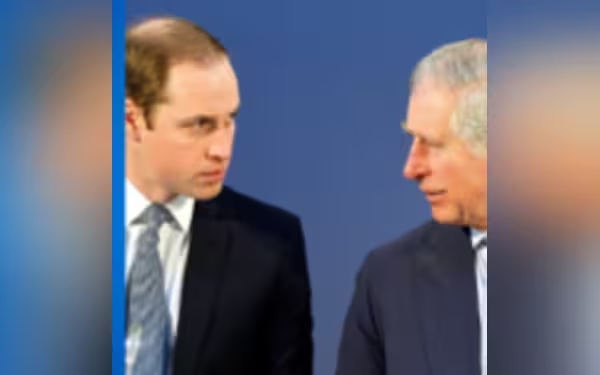Saturday, November 16, 2024 05:56 PM
Royal Family Tensions Rise Over King Charles' Health and Succession Plans
- King Charles' health sparks succession discussions.
- Prince William prepares for potential kingship.
- Family dynamics shift amid health concerns.
 Image Credits: pakistantoday
Image Credits: pakistantodayTensions rise in the British royal family as King Charles' health issues prompt discussions on succession and Prince William's future role.
In recent months, the British royal family has found itself at the center of a storm of speculation and concern, particularly following King Charles III's public announcement of his cancer diagnosis on February 5, 2024. This revelation has not only raised questions about the king's health but has also sparked discussions about the future of the monarchy and the potential ascension of his son, Prince William, to the throne as King William V.
King Charles, who has shown remarkable strength in the face of his illness, is currently undergoing a combination of advanced medical treatments and natural remedies. However, the gravity of his condition has led royal insiders to believe that preparations for a transition in leadership are already underway. This shift in focus has created a palpable tension within the royal family, as members navigate the delicate balance between supporting the king and preparing for what may come next.
When Charles became king, many anticipated a lengthy reign, similar to that of his parents, Queen Elizabeth II and Prince Philip. However, the unexpected nature of his diagnosis has prompted a reevaluation of this expectation. The king's decision to publicly disclose his health struggles has been seen as a break from royal tradition, setting the stage for what courtiers are now referring to as a “change of reign.”
In the wake of this announcement, Prince Harry made a swift trip from California to be with his father, indicating the seriousness of the situation. Meanwhile, Prince William has begun to take on more responsibilities, including appointing a new private secretary to help him prepare for his future role. However, William's plans have faced interruptions due to his wife, Kate, being diagnosed with cancer. Thankfully, Kate is now recovering, allowing William to resume his royal duties and gain a more prominent public profile.
As the royal family navigates these challenges, the dynamics between its members are shifting. Prince Harry's hopes for reconciliation with the royal family appear to be dwindling as William's influence grows. While Harry has expressed a desire to mend his relationship with the monarchy, the prospect of William ascending the throne sooner than expected complicates matters. In contrast, Meghan Markle seems to have found peace with her distance from royal affairs, while Harry continues to grapple with the ongoing family tensions.
The recent release of a polished Instagram video by William and Kate, announcing Kate's recovery and featuring her parents instead of King Charles, further illustrates the changing power dynamics within the family. This video, which did not receive the king's approval, symbolizes the increasing authority being transferred to the younger generation.
Discussing the potential death of a reigning monarch is undoubtedly a sensitive topic, yet it remains a matter of public interest due to the hereditary nature of the British monarchy. As King Charles continues to battle his health issues, the internal struggles of the royal family regarding the future reign are becoming increasingly evident.
The royal family's current situation serves as a poignant reminder of the complexities of leadership, legacy, and familial bonds. As they navigate this challenging period, the world watches closely, eager to see how the monarchy will adapt and evolve in the face of adversity. The future of the British royal family may be uncertain, but one thing is clear: the dynamics within this storied institution are changing, and the next chapter is already being written.













